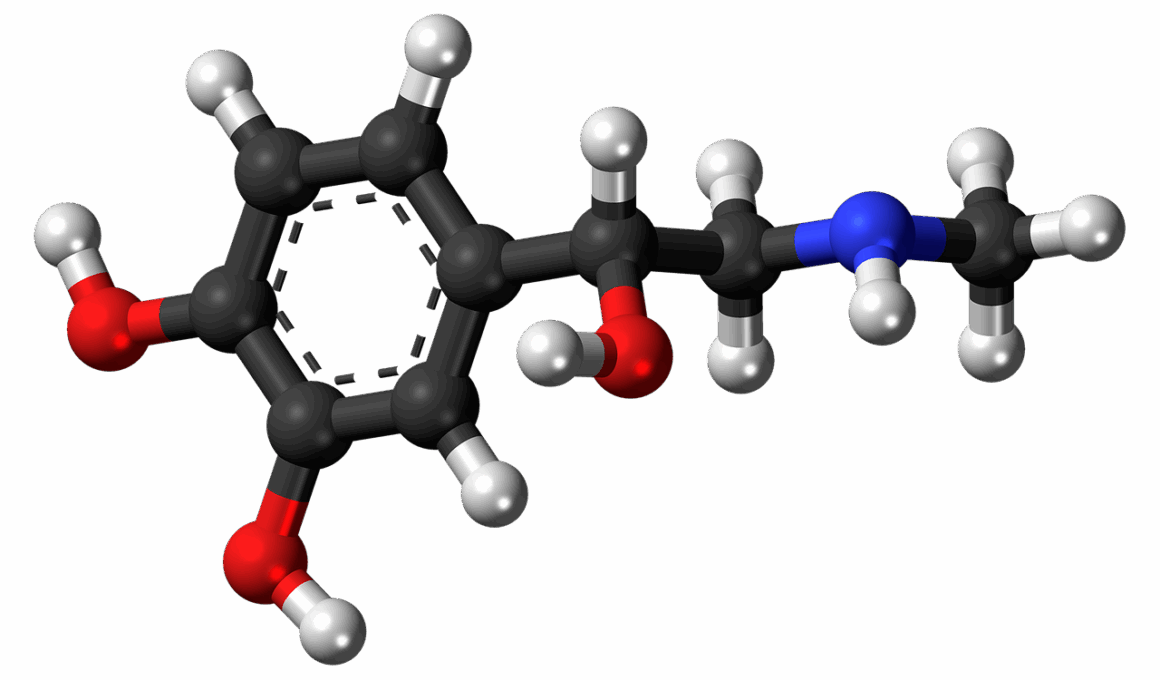Stress Hormones and Their Effects on Mental Focus in Competition
In the world of sports, competition triggers various physiological responses, particularly the release of stress hormones. Key hormones such as cortisol and adrenaline prepare the body for high-performance situations. These hormones affect mental focus, especially during intense competition when athletes face pressure. Cortisol, often termed the stress hormone, increases glucose availability, which influences energy levels. Conversely, adrenaline boosts heart rate and alertness, enabling quick reactions. Understanding how these hormones affect an athlete’s mindset is critical for optimizing performance. Too much cortisol can lead to anxiety and impaired focus, creating difficulties in decision-making. On the other hand, moderate levels may enhance concentration by sharpening cognitive functions. Many athletes engage in strategies such as mindfulness and controlled breathing to regulate hormone levels. It is essential to identify the right balance, as an excess of stress hormones can be detrimental. Coaches, sports psychologists, and athletes must collaborate to devise personalized approaches that address this intricate relationship between stress hormones and mental clarity. Effective management can significantly improve performance outcomes in sports competition.
The connection between stress hormones and mental focus extends beyond physical readiness; psychological factors also play a substantial role. Sports psychology emphasizes the importance of mental training techniques that help mitigate stress. Techniques such as visualization, goal setting, and self-talk can assist athletes in managing their mental states effectively. Incorporating these strategies can lead to enhanced performance outcomes during competitions. Moreover, understanding individual responses to stress is vital since athletes vary in their hormone sensitivity. Some may thrive under pressure, while others struggle. This individual variance necessitates a tailored approach, where athletes learn to harness their unique stress responses effectively. Research has shown that athletes with higher emotional intelligence often perform better under stress. Developing resilience can help manage stress levels and improve overall focus. Regular mental conditioning sessions help athletes prepare for the inevitable pressures of competition. Coaches and trainers play a crucial role in this developmental process. By building a solid mental foundation through training, athletes increase their chances of maintaining focus and achieving their performance goals, reducing the negative impact of stress hormones on their capabilities.
Impact of Training on Hormonal Response
The impact of rigorous training routines on hormonal response cannot be overlooked in the context of sports science. Consistent training leads to adaptations that may enhance an athlete’s ability to manage stress hormones during competition. Over time, athletes develop greater resilience, which can lower cortisol levels during high-pressure events. This physiological adaptation is critical, as it allows them to maintain a calm and focused mindset. The interplay between physical conditioning and hormonal regulation signifies the importance of a comprehensive training program. Endurance training, for example, may enhance the body’s efficiency in managing stress hormones, subsequently improving mental focus. Additionally, strength training has also been linked to increased testosterone levels that can positively influence mood and focus. As athletes undergo training, they should also pay attention to recovery strategies. Adequate rest and nutrition play a pivotal role in hormone regulation as well. Athletic programs incorporating both physical and mental training aspects result in better preparation for competitive situations. Therefore, a holistic approach encompassing various training modalities can help optimize hormone responses and mental focus during competition, enhancing performance outcomes significantly.
Nutrition also significantly influences stress hormone responses in athletes. A balanced diet rich in vitamins, minerals, and macronutrients supports the body’s physiological and psychological needs. Studies indicate that omega-3 fatty acids, for instance, help regulate cortisol levels and stabilize mood. Similarly, ensuring an adequate intake of complex carbohydrates provides sustained energy, preventing drastic fluctuations in hormonal levels. Specific nutrients contribute to neurotransmitter synthesis, promoting a positive mental state and optimal focus. Foods with high glycemic indexes can create a rapid energy spike that may lead to energy crashes, influencing cortisol levels adversely. Consequently, understanding the links between nutrition and stress hormone management is essential for athletes aiming to enhance their performance. Social support systems, including family and friends, are also essential in this equation. They provide emotional backing that can alleviate stress and subsequently impact hormonal responses. Nutrition and social factors interconnect, emphasizing a comprehensive approach to athlete health. When sports professionals combine nutritional plans with training regimens and emotional support, athletes are well on their way to optimizing mental focus and managing stress hormones effectively in competitions.
Mindfulness and Stress Management
Mindfulness practices are gaining traction in the world of sports science, particularly concerning mental focus and hormone regulation. Athletes engaging in mindfulness meditation report decreased levels of stress hormones and improved concentration. These practices enhance an athlete’s awareness of their physiological state, allowing for better management of stress responses. Techniques such as breathing exercises, meditation, and yoga play significant roles in fostering a calm and focused mindset before competitions. The regular practice of mindfulness helps athletes develop an acute understanding of how stress impacts their performance. By cultivating a consistent mindfulness routine, athletes can create a cognitive buffer against the negative effects of stress hormones. Research shows that those incorporating mindfulness into their training regimens enjoy enhanced focus, improved decision-making, and reduced anxiety. Coaches who integrate mindfulness training into their programs will equip athletes with powerful tools for performance under pressure. Mental clarity achieved through these practices enables athletes to respond rather than react to competitive loads. By focusing on the present moment, athletes enhance their performance by limiting distractions caused by stress, ultimately contributing positively to their competitive outcomes.
Finally, the psychological component of injury management incorporates understanding stress hormones in competitive settings. Injuries often produce significant psychological stress, resulting in elevated cortisol levels, which can hinder recovery and focus. It’s essential for athletes to recognize that maintaining mental clarity during the rehabilitation process is crucial. Sports psychologists advise athletes to utilize visualization techniques that reinforce their recovery goals and positive outcomes. Engaging in mental exercises during recovery can help combat the anxiety associated with being sidelined. Therefore, a proactive attitude toward mental fitness plays a vital role in managing hormone levels during these challenging times. Facilities that prioritize psychological support alongside physical rehabilitation can enhance recovery outcomes significantly. The integration of sports nutrition, recovery strategies, and psychological resilience training addresses the multifaceted nature of an athlete’s journey. A comprehensive approach proves effective in managing stress hormones throughout an athlete’s career, particularly when facing situations like injury. Recognizing the interconnectedness of physical and mental aspects ensures athletes remain focused on their performance objectives despite external stressors.
Conclusion: Comprehensive Strategies for Athletes
In conclusion, understanding the intricate relationship between stress hormones and mental focus in competitive sports is crucial. Athletes must develop personalized strategies that address both physical and psychological aspects to optimize performance. A comprehensive approach combines training regimens, nutritional plans, mindfulness practices, and effective recovery techniques. This multidimensional strategy ensures that athletes not only prepare physically but also mentally for competition. By managing stress hormones, athletes enhance their mental focus, significantly contributing to their overall performance. Moreover, coaches and sports psychologists play vital roles in guiding athletes to recognize how their bodies respond to stress. Building resilience offers a pathway to maintain mental fortitude under pressure, allowing for improved decision-making and performance outcomes. As sports science continues to evolve, ongoing research will further unravel the complexities of stress hormones and their effects on athletes. Ultimately, a commitment to holistic athlete development can lead to greater success across all competitive levels, ensuring that mental focus remains sharp despite the pressures of competition. Thus, athletes equipped with comprehensive strategies will be better positioned to excel in their respective sports, navigating the challenges that arise in competitive environments with confidence.
The integration of various training modalities is vital for optimal stress hormone management. Periodization in training allows athletes to peak at the right moment while ensuring adequate recovery. Balancing intensity and volume in workouts is essential because overtraining can cause elevated cortisol levels, leading to burnout. Monitoring recovery through wellness questionnaires can provide insights into stress hormone impacts on performance. Athletes must prioritize sleep, adhering to recovery protocols designed to aid in the hormonal balance of the body. Regulating circadian rhythms through consistent sleep patterns also plays a vital role in hormonal regulation. Moreover, emerging technologies, such as wearable devices, can help athletes track their physiological responses to training loads and stress. These innovations support data-driven decisions regarding training and recovery strategies. Implementing a tailored program grounded in the science of stress hormones allows athletes to maximize their potential while minimizing negative repercussions. As sports science progresses, understanding and managing stress hormones will remain pivotal in fostering athlete development while reaching competitive goals. By addressing this delicate balance, athletes can achieve a higher level of performance, gaining a competitive edge in various sporting arenas.


